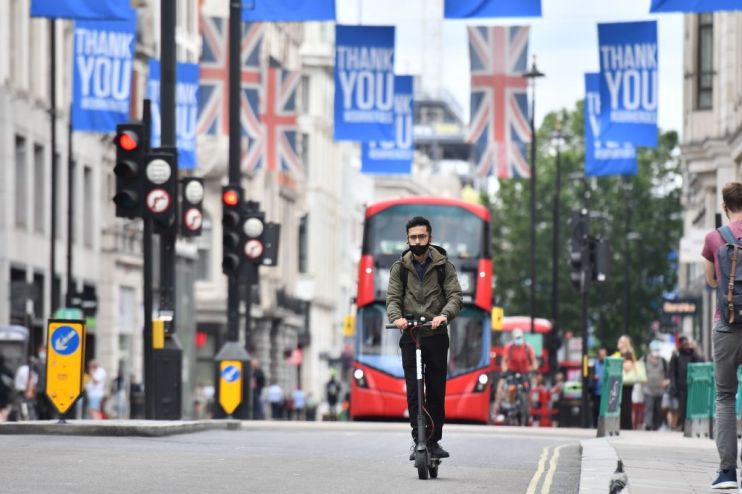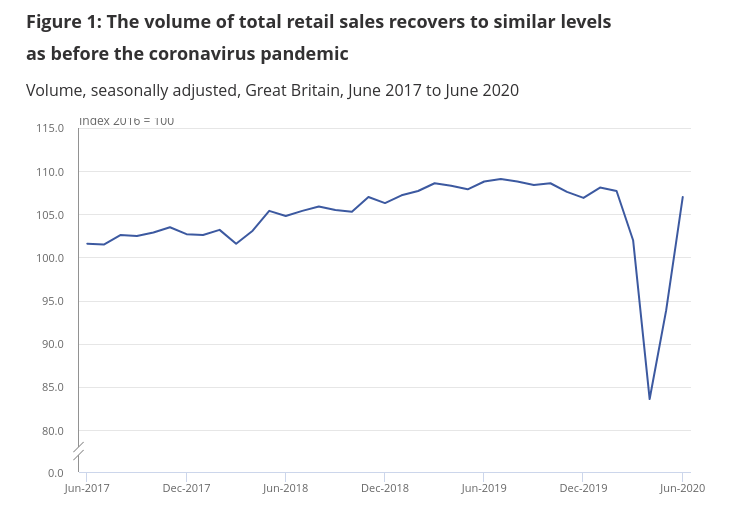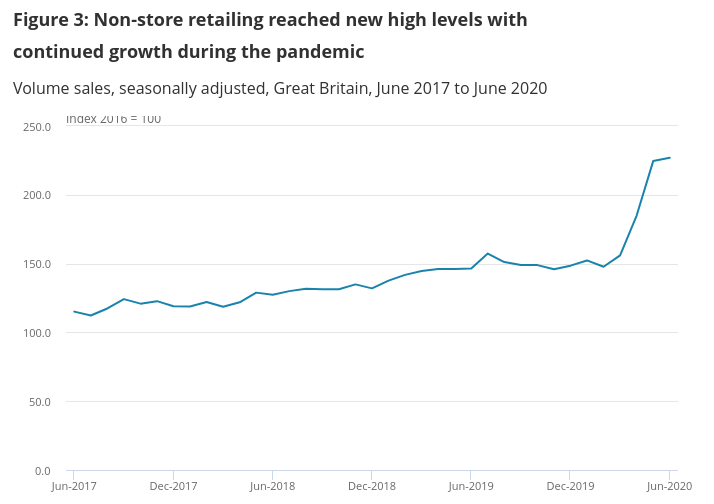UK retail sales surge close to pre-lockdown levels in June recovery

UK retail sales almost recovered in June from their staggering drops during Britain’s coronavirus lockdowns, official data showed today.
The volume of retail sales jumped 13.9 per cent from May to June as shops and non-essential stores opened their doors to customers once again following a lockdown that started on 23 March.
Non-food store sales rocketed 45.5 per cent month on month in June, and fuel leapt 21.5 per cent, according to the Office for National Statistics (ONS).
But levels were still impacted by the cliff-edge plunges experienced in March and April during lockdown.
Supermarkets hit new highs in June however, with food sales 5.3 per cent higher. And online shopping was 53.6 per cent higher than in February – just before the pandemic hit the UK.
The proportion of UK retail sales taking place online slipped slightly from a record 33.3 per cent in May to 31.8 per cent in June. But that was much higher than the 20 per cent ratio reported in February.
UK retail sales enjoy V-shaped recovery
“The retail sector bounced back as the reopening of shops released pent-up demand for some retailers,” Richard Lim, CEO, Retail Economics, said. “But the recovery is being felt unevenly across the sector with clothing retailers remaining under significant pressure.
“Some consumers searching to break the monotony of being at home headed for the high street, but numbers remained considerably lower than pre-Covid levels.”

Jeremy Thomson-Cook, chief economist at currency exchange firm Equals Money, said the retail sector enjoyed a V-shaped recovery in June.
But he warned the initial bounce back will fade away, leaving Brits waiting to see the true extent of the damage lockdown has caused.
“There were a number of driving forces at play which saw sales rise; pent up demand following an easing of lockdown conditions, a lack of alternatives, good weather and the furlough scheme still running at full steam,” he said.
“All four of these driving forces are likely to dwindle in the coming months and that’s when we’ll see just how strong demand is. At that point the economy will have to deal with the triple cocktail of uncertainties that an end to the furlough scheme, a winter wave of Covid-19 cases and Brexit all represent.”
Ruth Gregory, senior UK economist at Capital Economics, said online spending exaggerated the extent of the recovery of UK retail sales in June.
“Since the sector has benefited disproportionately from online spending and a switch away from other types of spending, this overstates the extent of the recovery in the wider economy,” she said.
Household goods spearhead recovery
Still, the recovery in UK retail sales impressed economists. Sales sank 22 per cent at their nadir during April’s lockdown. But a 45.5 per cent June surge in non-food products left UK retail sales just one per cent below their pre-pandemic level.
Household goods soared 66.7 per cent month on month. And clothing sales recovered by a staggering 70.2 per cent compared to May, while department store sales rose 8.1 per cent.
Still, non-food store sales were still 15 per cent lower than they were in February overall. And clothing sales are still down by around 34 per cent.
Face masks rule could offer online sales extra boost
Economists remained optimistic given the rebound evident in today’s UK retail sales data, though.
They pointed to pickup in online sales in particular, which now represent more than 30 per cent of all UK retail sales, versus 20 per cent pre-lockdown.

“We continue to witness an extraordinary shift towards online shopping,” Retail Economics’ Lim said. “A sizeable proportion of consumers are shopping for products online which they had previously only ever purchased in-store.”
He warned that today’s new law stating shoppers in England must wear face masks will only cause more to shop online, in a blow to high street shops.
“As the mandatory wearing of face masks comes into play, it will only create more friction for shoppers. Our research shows that 30 per cent of consumers feel it will lead them to visit shops less frequently.”